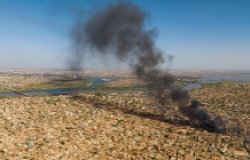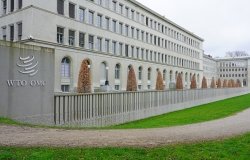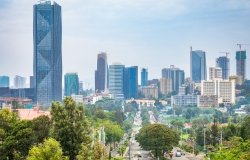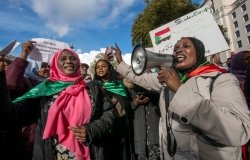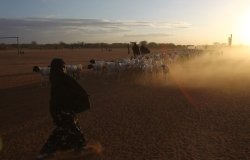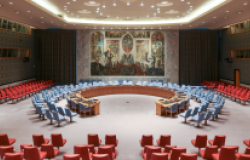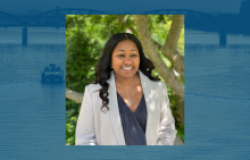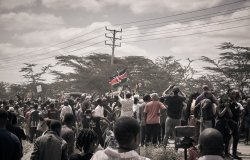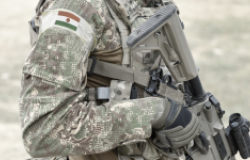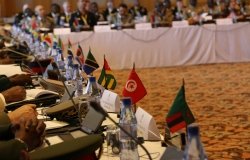
A blog of the Africa Program
The Experiences of Women Combatants in Post-Boko Haram Peace Processes: A Discord Between Impact and Redress
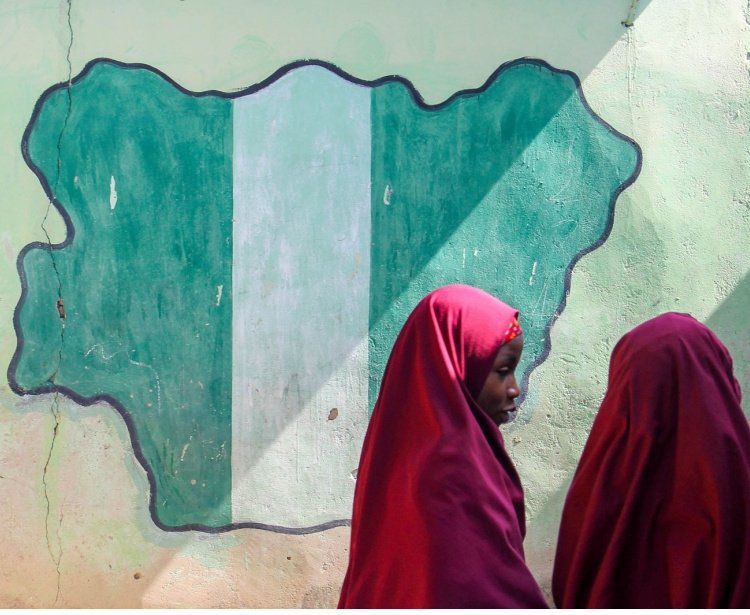
Women’s experiences with certain post-conflict processes in the context of the Boko Haram crisis go beyond marginalization. Women are completely invisible. Though the traditional understandings of what it means to be a female and conventional expectations of women in the Lake Chad Basin (LCB) have significantly evolved since Boko Haram, responses to the crises do not capture this evolution.[1]
Straddling the border regions of Nigeria, Cameroon, Niger, and Chad, the LCB has been Boko Haram’s operational zone for over fourteen years, precipitating a severe socio-economic and humanitarian crisis in the region. Boko Haram conducted an atypical campaign vis-à-vis women and girls. Defying views that homogenize women as victims in conflicts, the militant group disproportionately relied on women in core aspects of its violent extremist strategy. Field research indicates that women and girls predominantly served as suicide bomb carriers, intelligence gatherers, provisioners, logistics coordinators, and indoctrination roles. From 2011 to 2018, out of more than 434 Boko Haram suicide bombers identified in the LCB, 244 were female, and the gender of another 96 remained unknown. Many of these women, most of whom were coerced into participation, shared their harrowing stories with me. They spoke of the enduring effects of participating in acts of terrorism on their lives and how their experiences continue to be minimized.
Despite their visible trauma and the definite changes in the roles they play in society, women continue to be invisible in peace processes post-Boko Haram.
In a bid to stem the tide of violence, the Nigerian government and certain non-state actors have initiated different peace processes, including criminal prosecutions and deradicalization and reintegration programs. However, these processes have failed to account for women’s role in the conflict, thus making them invisible. For example, the government’s flagship deradicalization and reintegration program—Operation Safe Corridor—does not admit women. Despite the conflict’s radicalizing impact on women, they are denied access to the deradicalization program. The government’s defense of this policy is the conservative nature of religion and culture in Northern Nigeria, which limits the close association and interaction of men and women. This approach, however, cements the conventional view of women as victims, which homogenizes women and their experiences during the conflict. This exclusion has real-life implications for the women who, upon return from Boko Haram enclaves, find themselves alienated from society and without any comprehensive way to process the trauma and move on with their lives.
Despite their involvement in core areas of conflict, very few women were presented for prosecution in the 2017 and 2018 trials of alleged Boko Haram associates.[2] Of the 200 defendants presented in the July 2018 trial, only three were women, and only one was found guilty and sentenced to time already spent in detention. One of the Federal Government’s lead prosecutors during those trials indicated that only a handful of women were presented at the trial. According to the prosecutor, most of the women presented were minors who were subsequently discharged and acquitted because of their age. Considering that research has established women’s potential culpability in violent acts, the prosecutions show a discord that mirrors the homogenization of women as victims and the minimization of their agency to make their own choices, whether they be violent or pacific.
A proportional representation of women in such instances will increase the likelihood of these processes’ relevance to women’s experiences.
The implication of the above is that despite evidence to the contrary, women are considered to be all victims and not perpetrators of violence. Despite their visible trauma and the definite changes in the roles they play in society, women continue to be invisible in peace processes post-Boko Haram. Before Boko Haram, women were conventionally believed to be without agency for violence. However, with Boko Haram’s extremist strategy feminizing the notion of violence, that view has radically changed. Due to the crisis, many women have now become household heads and now engage in socio-economic activities without significant backlash from the conservative society. Nonetheless, this change is not reflected in peace processes.
However, how they cope with that invisibility could have significant implications for peace in Nigeria’s Northeast and the larger LCB. To cope, women will have different responses, including exploiting invisibility. For example, women perpetrators who were excluded from deradicalization and reintegration programs may continue to cooperate with Boko Haram foot soldiers, providing intelligence and materials support, among other things.
To manage potential negative fallouts from this discord, an official acknowledgment of women’s varying and complex roles during conflict is a crucial first step. This acknowledgment may better ensure that post-conflict interventions recognize and address women’s experiences. Furthermore, my experience in the field showed a marginal representation of women during the design of transitional justice processes. From what I observed, on average, women comprised less than 20% of those involved in deliberation and decision-making in these processes.[3] A proportional representation of women in such instances will increase the likelihood of these processes’ relevance to women’s experiences. The absence of women at the design table is not without consequences. It is responsible for the marginalization of women in post-conflict society. A response that is not designed to cater to women could also increase the vulnerability to radicalization.
A systematic and multi-pronged program in the image of Operation Safe Corridor could also be designed for women. Currently, attempts to cater to women’s needs are sporadic, unorganized, and lack government presence. Given women’s deep involvement in the violent extremist campaign, a more systematic and deliberate approach to address their experiences could help facilitate sustainable peace and stability in the region.
Pelumi Obisesan Aina is a Ph.D. Candidate in Development Studies at SOAS, University of London. Her current research analyses women’s experiences with post-conflict processes against the background of the Boko Haram crises.
The opinions expressed on this blog are solely those of the authors. They do not reflect the views of the Wilson Center or those of Carnegie Corporation of New York. The Wilson Center's Africa Program provides a safe space for various perspectives to be shared and discussed on critical issues of importance to both Africa and the United States.
References
In September 2021, when I set out to investigate women’s experiences with post-conflict processes in the Lake Chad Basin (LCB) post-Boko Haram, I had preliminary ideas about women’s marginalization from the peace-building and decision-making processes. However, after completing my fieldwork in Nigeria in June 2023, I realized that women are entirely made invisible.
This references data from my interview with the Lead Prosecutor during the 2017 and 2018 Boko Haram trials.
In meetings, workshops, and conferences to discuss approaches to manage individuals formerly associated with Boko Haram, women were always marginally represented. Based on my calculations, women's representation was no more than 20% in all those meetings I attended. (I attended 8 of those meetings during my time in the field.)
About the Author
Pelumi Obisesan Aina

Africa Program
The Africa Program works to address the most critical issues facing Africa and US-Africa relations, build mutually beneficial US-Africa relations, and enhance knowledge and understanding about Africa in the United States. The Program achieves its mission through in-depth research and analyses, public discussion, working groups, and briefings that bring together policymakers, practitioners, and subject matter experts to analyze and offer practical options for tackling key challenges in Africa and in US-Africa relations. Read more


